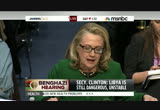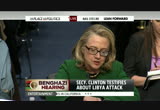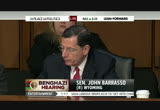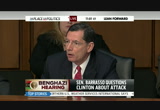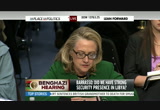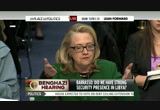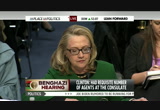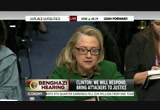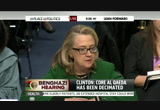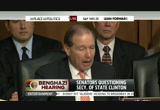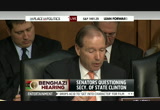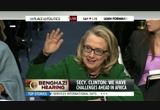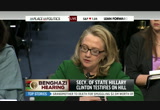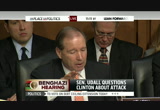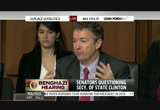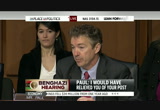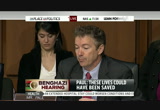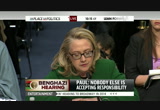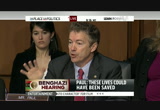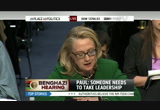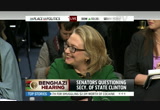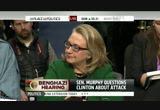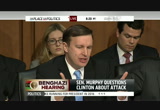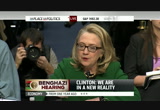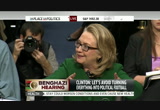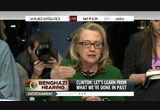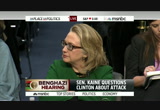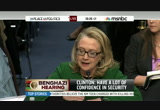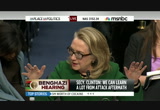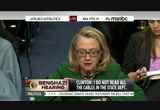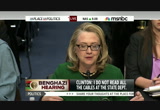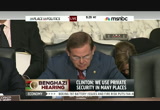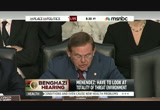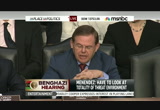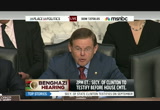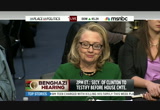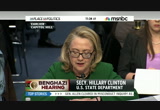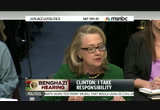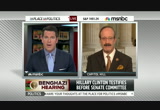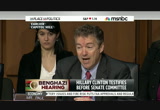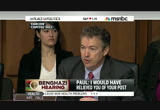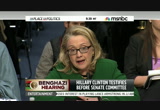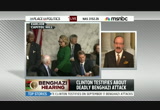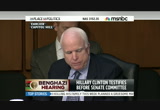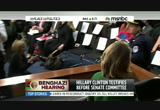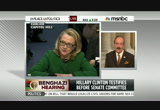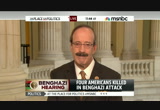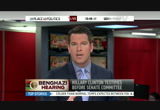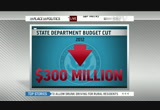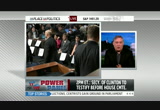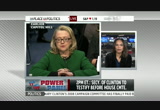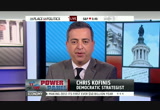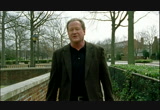tv MSNBC Live MSNBC January 23, 2013 8:00am-9:00am PST
8:00 am
and we need the help of this committee. i am one who believes that we have to both walk and chew gum at the same time. we have to deal with our own economy and other physical situation. that is a given because that is the source of our strength and our capacity. but we also have to be smart about making the right investments in diplomacy and development to try to solve problems and prevent them. so you know, i have outlined what should be a no brainer. let us have the permission to take money we already have. we're not asking for more money and put it to work where the arb told us to do, and then let's look at the budget as we move forward. now if sequestration will be very damaging to the state department and usaid if it does come to pass because it throws the baby out with the bath.
8:01 am
are there programs we could reduce and make more efficient? yes, that's what i've been trying to do, push that forward and that's what the qdr process was about. but, there are also a lot of essential programs, first and foremost security of our personnel in dangerous places that we can't afford to cut more of. i hope we get the transfer authority and have a sensible budget discussion going forward. >> thank you. >> thank you, mr. chairman. madam secretary, i want to thank you for your incredible commit. to this lady as first lady as well as secretary of state and as a doctor i will tell you i have seen you work yourself to exhaustion, not for your own benefit but for the benefit of the people of the country and country is grateful for that. >> thank you. >> i like you agree that we need to make sure that something like this never happens again. i've looked at it like the challenger explosion where we lost those seven astronauts
8:02 am
because of an o ring and problems there. we didn't see it coming but we should have seen it coming. as you said, you never saw the security requests and vice president biden in the presidential debate said no one told us. the current -- the concern is we should have been seeing these sorts of things. there were attacks on the british ambassador and attacks on the red cross that they pulled out of benghazi. there were attacks on the consulate itself. yet, we had no evacuation plan established in spite of the fact that months earlier in libya we had i think -- an italian ferry boat to be able to get people out who were in danger who were diplomats at the time. so those are the concerns. we want to make sure their security for our ambassadors, which gets to the issue, we talk about what happened on the talk shows. and they said the best
8:03 am
information that was best available at the time, the american people heard we had a substantial security presence. thy heard we obviously heard we did have a strong security presence. and obviously there was a significant security presence. and i just believe that that wasn't the case. and i would ask you today, if you believe we had a significant substantial and strong security presence in libya at that time? because we want that for all our ambassadors. >> right. senator, we had a security presence that was mutually reinforced with the annex. we had had as you rightly point out and others before, you previous incidents, not only against our compound but against the british, the red cross and others. and what we -- what we have
8:04 am
accepted from the arb recommendation is that even though there was a back and forth in the cables and discussions, you need three ds agents or have five. we had five there but unprecedented attack as one of the former rsos, regional security officers, tefd testified, an attack that was not expected. even though on that night we had the rec quis it number of ds agents. we could get mired in the back and forth but i believe we will be doing more to help prevent future tragedies and attacks if we take the arb recommendations because after all, they had no stake in this debate one way or the other. they just wanted to look at the facts, which they did an excellent job doing, and then tell all of us what we needed to do. that's what i think our highest responsibility is. >> thank you madam secretary. thinking about future attacks
8:05 am
and trying to prevent those. on september 12th, the president vowed to quote bring to justice the killers who attacked our people in benghazi. so we ask the question and senator rich talked about where the people that perpetrated the recent attacks in algeria are they em boldened because no one paid a penalty for the attack in benghazi. >> i believe that drk i know that the fbi has been briefing some committees, i assume members or staff of this committee are included. i don't know that but i would assume, about the progress of their investigation. i got the most recent update from the director a few days ago when he returned from north africa. they are following some very promising leads and putting together cases. they would have to speak to you
8:06 am
directly about that in a classified setting. but i think what they are trying to determine is how best to respond. and i think what the president clearly said is we will respond and we will bring those to justice. and i don't think anybody should doubt this president at his word. we have some very good example that it may take time but he does not in any way divert attention from the goal of bringing them to justice. >> thank you, madam secretary. the president also said al qaeda has been decembimated and in li of the recent terrorist acts tists we continue to see in north africa, around the world, would you character that as al qaeda has been decimated? >> core al qaeda certainly has been. you would hear the same from the intelligence community or d.o.d., the work that has been done in afghanistan and the borders area between afghanistan
8:07 am
and pakistan certainly has taken out a whole kad dre of leadership. what we're seeing now are people who have migrated parts of the world who are affiliates, part of the jihadist sind indicate, some of them use that name and others use different names, but the fact is they are terrorists. they are extremists and they have designs on overthrowing existing governments, even those new islamists governments of controlling territory. although there has been the decimation of al qaeda, we do have could contend with the want to bes and affiliated going forward. >> thank you. >> thank you mr. chairman and thank you, madam secretary, for being here.
8:08 am
and it's great to see you today. you have been i think a real dedicated public serve ant for your country and your travels around the world, the million miles that you've put on and all of the countries you visited. and i think you've been to many countries where they've never had a secretary of state. and i've seen firsthand when i've been to many of these countries, the difference it makes to have you there on the ground. so i first of all just want to thank you for that and i know it does take a toll but you are incredibly dedicated to that. secondly, it's great to see you here in good health. >> thank you. >> smiling and engaging with all of us. and i want to add to the list people -- senators going down the line talked about some of your accomplishments. i know previously i talked to
8:09 am
you about cook stoves, which i know has been one of your initiatives. and it's once again an example of picking something where people around the world who are living on a dollar or two a day, if you put in a technology like a up to dated cook stove, you can make a big difference on their health, in the health of their children and make a big difference on the environment. i would add that to the list that has been given here today of very thoughtful policy making on your part. now, one of the findings the board made in its report is that -- and i'm quoting here, the total elimination of risk is a nonstarter for u.s. diplomacy given the need for the u.s. government to be present in places where stability and security are often most profoundly lacking and host government support is sometimes
8:10 am
minimal to nonexistent. and i'm ending the quote there. this report really as you know, madam secretary, underscores the difficulty in finding the right balance between engagement and security. and i fully support as you've asked here and you've made the point to our committee, the idea that we should reprogram this 1.4 billion and get our act together and respond to the recommendations. but my question here revolves around these high risk posts. i think the term you've used is having 20 of them. is this how many there are, how many high risk posts we have around the world? >> well, it's a sliding scale. >> yes. >> there's very high and there's -- it's a constantly evolving threat environment. >> can you give us a little range, very high and -- >> i would like to give you that
8:11 am
in a classified document because i don't think it helps us to point out the ones that we think are most at risk and then the ones that would be perhaps in a secondary category. but i think it's fair to say, senator, we operate in pakistan, iraq, afghanistan, yemen. we operate in places where we know that our facilities are being surveilled for potential attacks, where we have a steady intel stream of plotting against us. we know that. and we make the decision, which is a difficult decision, as to whether or not that mission continues. and i have to say that we really rely on our security professionals to implement the protocols and procedures. and i have to say they do a tremendous job. the vast majority of the cases i could give you a long list of
8:12 am
attacks averted, of assassinations stopped and kinds of daily efforts that the diplomatic security officials are engaged in. i have a lot of confidence in them but we're going to do what we can to make sure that they get the support within our bureaucracy that they deserve out on the ground protecting our diplom diplomats. >> and i know i'm -- i want to obey the time because you do need to move to the house and others want to question. but maybe you could answer this for the record, does it make sense that in some of these high risk areas that we consolidate those particular areas with more secure areas and then be able to be in a situation where our personnel would be safer? and i'm not asking you really to answer that now. my time has run out and i want
8:13 am
others to be able to question. but if you could give us an answer for the record -- >> i will do that and i will say, senator, one of recommendations out of the east africa arb was to do that and that is done again in the vast majority of cases wherever it's possible to do what's called co-locate. but we're taking a look at that as well to see what more we can do. >> senator paul. >> thank you for appearing, secretary clinton, and i'm glad to see your health is improving. one of the things that disappointed me the most about the original 9/11, no one was fired. these are judgment errors and the people who make judgment errors need to be fired and no longer in the decision of making calls. the review board, a lot of them found are common sense and done and it's a failure of leadership they weren't done in advance and four lives were cost in light of
8:14 am
this. i'm glad you're accepting responsibility. ultimately with your leaving you accept the culpability for the worse tragedy since 9/11. i mean that. had i been president and found you did not read the cables from benghazi and from ambassador stevens, i would have relieved you of your post. i think it's inexcusable. i think we can understand you're not reading every cable. i can understand maybe you're not aware of the cable from the ambassador in vienna that asks for $100,000 for an electrical charging station or maybe you're not aware your department spent $100,000 on three comedians who went to india on a tour. i think you might be aware of the 80 million spent on a consulate that will never be built. i think it's inexcusable you did not know about this and did not read these cables. i would think by anybody's estimation, libya has to have been one of the hottest of hot
8:15 am
spots around the world. not to know of the request for securities really i think cost these people their lives. their lives could have been saved had someone been more available or aware of these things, more on top of the job. and the thing is, i don't suspect you of bad motives. the review board said these people weren't willfully knowledge. i don't suspect your motives of wanting to serve your country, but it was a failure of leadership not to be involved. it was a failure of leadership not to know these things. so i think it is good you're accepting responsibility because no one else is. and this is -- there is a certain amount of culp ability to the worst tragedy since 9/11 and i'm glad you're accepting this. now, my question is, is the u.s. involved with any procuring of weapons, transfer of weapons, buying, selling, anyhow transferring weapons to turkey out of libya?
8:16 am
>> to turkey? i will have to take that question for the record. nobody has ever raised that with me. >> it's been in news reports that ships have been leaving from libya and they may have weapons and what i'd like to know, the annex that was close by, were they involved with procuring or buying or selling obtaining weapons and were any weapons being transferred to other countries, any countries, turkey included? >> well, senator, you'll have to direct that question to the agency that ran the annex. i will see what information is available and -- >> you're saying you don't know. >> i do not know. i don't have any information on that. with respect to personnel, senator, first, that's why we have independent people who review the situation as we did with the pickering and mullen arb. all four have been removed from their job and secondly placed on
8:17 am
administrative leave while we step through personnel process to determine the next steps. third, both ambassador pickering and admiral mulen expectly highlighted the reason it was -- under regulations, unsatisfactory leadership is not grounds for finding a breep of duty. the arb did not find they breached their duty. so i have submitted legislation to this committee, to the congress to fix this problem so future arbs will not face this situation. >> here's the problem. the review board has these recommendations but there's one thing they failed to address and you failed to address and sets us up for another tragedy like this, they should have never been sent in there without a military guard. this should have been an embassy like in baghdad in a war zone and it should have been under military guard. significant military guard, defense department command. i don't think the state department is capable of being in the war zone and protecting these people, still don't think
8:18 am
that. another tragedy could happen. i think another tragedy could happen in another war zone around the world. i think someone needs to make an executive decision, someone needs to take leadership. and with that leadership should be you shouldn't send them out with no marines and marines to guard records not people or same type of embassy stuff you have in paris. that's inexcusable. >> i'm hear to answer questions the best i can. i am the secretary of state. and the arb made very clear that the level of responsibility for the failures that they outlined was set at the assistant secretary level and below. the u.s. administration sent officials to the hill more than 30 times. we've given as many information. we've been as transparent as we can. obviously we will continue to brief you and others to answer
8:19 am
any and all questions that you have about going forward. the reason we put into effect an accountability review board is to take it out of the heat of politics and partisanship and accusations and to put it in the hands of people who have no stake in the outcome. the reason i said make it open, tell the world, because i believe in transparency and taking responsibility and i have done so. i hope that we're going to be able to see a good working relationship between the state department and the committee going forward. >> thank you. senator murphy. >> thank you very much, mr. chairman. secretary clinton, i approached this hearing with some degree of sadness, it's my first and your last. but i am so appreciative of your service. you've done such credit to this nation and though we will be
8:20 am
sorry to see you go, we know you will continue to give us good counsel and advice in the coming years. i think some people on this committee want to call the tragedy in benghazi the worst since 9/11, it misunderstands the nature of 4,000 americans plus lost over ten years of war in iraq fought under false pretens pretenses. it was fought under false pretenses and also fought because we have a misunderstanding of what we could do and manage in that region. what was under our control. i guess my question to you, secretary clinton, is about what you're expectations are going forward in north africa. you referenced this in your opening remarks about actually what is under our control. one of the criticisms in the review board was that we didn't have a full understanding of
8:21 am
this complicated set of allegiances between jihadist groups that are shifting on an almost daily basis. i wonder when we do this relet trow inspective handwringing that he we give the impression we can know all and see all and control all in a region that we certainly are just beginning to stand up the kind of presence we may ultimately need and want. i guess i present this as that open-ended question to you. as we move forward and he especially for new members of this committee would will spend more time on africa and north africa than this committee has spent for. what are the expectations we should set as what we can control and what we can know and what changes on the diplomatic side we need to make in order to have a more solid footprint with neighbors there would may help
8:22 am
with intelligence and intervings of this complicated jihadist groups. >> it goes to the heart of the challenge we face. we are in a new reality. we are trying to make sense of changes that nobody had predicted but which we're going to have to live with. i can't do justice in the time i have left here to the really important issues that you have highlighted. but i think first and foremost, let's be honest with ourselves and let's avoid turning everything into a political football. let's instead try to just say, look, this is unprecedented. we don't know what's going to happen in this new revolutionary environment across north africa
8:23 am
and the middle east. but let's see what lessons we can learn from what worked in the past and see what is applicable and then let's bring people together who will really have the kind of open discussion that used to be the hall mark of this committee and of the senate. people used to have hearings where it wasn't to just to have the administration officials come up and ask the questions and go on from there. but really to delve into what works and doesn't work. bring in outside experts and let them debate in front of you and try to figure out what the best information going forward is. i mean, over the last weeks, i've pulled writings from, you know, what you would call very conservative and liberal comment ators who reached the same conclusion about what we should be doing in this region. we have to approach it with humility but we've got real as assets if we deploy them right
8:24 am
and helping rebuild security is essential. we did in colombia. it took a decade. we did it as a partner with others in somalia and there are a lot of other examples across the world. let's be smart and learn from what we did in the past and see what can be transferred into the present and future. and let's be honest in trying to assess it to the best of our abilities. i think with the new chairman and new ranking member from my conversations with both of them, i think this committee could play such an essential role in trying to answer your questions and put forth a policy that wouldn't go lurching from administration to administration and would be a steady won like we did with colombia and did in the cold war. let's be smart about this. we have more assets than anybody in the world. i think we've gotten a little bit, you know, off track in trying to figure out how to best
8:25 am
utilize them. >> thank you. >> madam secretary, i also regret that our overlap will be so brief. i think the country is at its strongest when we balance military strength with diplomatic strength and strength of our moral example. i can't think of a person that exemplifies that balance in a public service career as well as you do and i appreciate that. >> thank you, senator. >> a few detailed questions that trouble me in the unclassified version of arb, there's a comment, a brief one, in december of 2011, the undersecretary for management approved a one year continuation of u.s. special mission in benghazi which was never a consulate and never formally notified to the libyan government. why wasn't this special mission notified to the libyan government? is that a common practice? did the lack of notification have any connection with the
8:26 am
weak libyan governmental response on the 11th? and are there any changes in connection with the arb recommendations to the idea of special missions that are not notified formally to the host governments? >> congratulations to you as well, senator. and welcome to this committee. the united states notified to the libyan government the specific names of people who were serving in libya in both tripoli and in benghazi. that in no way affected the legal obligation of libya under the vienna convention. the problem as i said, was not their willingness, it was their capacity. as you know from the first time chris stevens arrived before the fall of gadhafi, relied not on any libyan governmental security but on the february 17th brigade and then we supplemented that after gad half halffy's fall
8:27 am
with ds agents and private security contractors. there was no effect on anything from the libyan government that was related to that. however, we do think that needs to be looked at going forward. the arb made a very important point. that the so-called temporary nature of the mission did prove to be confusing to people down the chain responsible for reading those cables, we get about, i don't know, how many millions of cables do we get. i have to confess, i do not read all the cables that come into the state department. that's why we have a huge workforce of people who are given responsibility and expected to carry forward that responsibility. and i think designating it as temporary in the arb's findings did cause an extra level of uncertainty to some extent. you know, as the chairman said
8:28 am
at the very beginning, quoting from the arb. there has been an aculturation in the state department, the husband resources to try to be as careful in spending money as possible, and then i think adding to that the fact it was quote, temporary probably did lead to some of the confusion that we later saw played out in the cables, but not the status of it for the libyan government. >> how common is it for us to rely on local nongovernmental security as was the case with the blue mountain and february 17th brigades in benghazi. >> it's very common. we privately employ security guards in a very high number of our posts around the world. if you go to the embassy in baghdad or embassy in kabul or really many of our high threat places, you will see private security guards.
8:29 am
now, because of problems with private security guard contracts that came to light in iraq, whereas you remember there were a lot of difficulties, these were private security guards who were protecting diplomats and development experts and other civilians. many countries have put very string ent requirements on private security guards and in fact in libya, the transitional government prohibited private security guards, which is why there was this -- unless they approve them. so they approved this blue mountain company that was a joint libyan british organization. but we use private security guards in many places because as i said historically marine guards do not protect personnel. their job is to really take care of classified material and to destroy it if necessary. we had no classified material at benghazi. and it was unfortunate that we
8:30 am
evacuated all of the americans and unclassified material was left behind. but we had no classified material. so there's -- there's going to be an effort because of this work that i have directed to really sort this out so that you know that everybody knows exactly what the protocols and rules are and we act accordingly. >> thank you, madam secretary. mr. clair. >> thank you. madam secretary, thank you for your thorough thoughtful and forthright answers. it's what we've come accustomed to from you. i understand we'll welcome you one more time when you come tomorrow to introduce senator kerry to the committee. we'll look forward to welcoming you there as well. i think that there are several takeaways here that are incredibly important. one is that we have to look at the totality of the threat environment versus just looking
8:31 am
for a specific credible threat when we are thinking about the protection of our foreign service personnel. and i see that we are moving in that direction. the other one is that changes in the department have clear lines of authority. and responsibility for security matters instead of silos and looking more in a horizontal nature and i understand that's underway. secretary gates used to famously argue that there are more people in military bands than in the entire foreign service. it seems to me that surely we can find the funds to protect our diplomats who serve on the front lines. and i am concerned when the arb says that the state department has been engaged for years in a struggle to obtain the resources necessary to carry out its work. and that has conditioned the thinking of some in the state department that it is imperative for the state department to be
8:32 am
mission driven rather than resource con strained, particularly in increasingly risky parts of the world. i look forward to immediately working with the ranking member in reaching out for chairman weiss to get that transfer authority within the existing budget. it's not been additional money, it's about taking money that is already been appropriated so you have the ability to start working and the next secretary has the ability to start working to protect our people as robustly as we can. and failure to do so, i think, is going to be a poor judgment on this congress if we can't get you at minimum that transfer authority. and finally, i know a lot has been made about the question of what was said and what was not said. and i simply think about that in the context that there are lessons to be learned there as well. in our drive to produce
8:33 am
information about a tragedy, an incident, we want to be able to get information as quickly as possible as we should. but i think what we know and what we don't know is equally as important. maybe the admonition that we should know before we speak is incredibly important. that would have been inkredly important when we were told there were weapons of mass destruction in iraq. as someone who voted against the iraq war in the house and didn't believe based upon what i was able to review there was such information, i look when we talk about tragedies and certainly benghazi was a tragedy, when we lost 4,486 american lives in iraq and thousands who have been injured and changed their lives forever, and increase the influence of iran, i think from my own special perspective that was truly a tragedy. there are lessons to be learned here. there will be questions for the committee to be able to ask for the record for the close of
8:34 am
business tomorrow since we don't expect you to be too much longer in your position. with the thanks of the committee for your appearance here today and your service, and senator corcoran? >> i want to add three more takeaways and they are based not only on testimony today but conversations over the last several days. you alluded to over the transome issues that state department sean white house deal with on a constant basis, i think this committee will be useful and can be useful in setting a long-term exploration of what our national interest is so we look at this over a long-term context. secondly, i know we talked extensively about the importance of having a full authorization, that that actually would be very helpful to people like you to come in for a very short period of time for us to help set the priorities. that would be something you would embrace and something this committee has never done since i've been here. thirdly, that we live in a world
8:35 am
now where we know that al qaeda is going to be a threat in north africa for years to come and we need to have policies that realize that and address it. i too thank you for your service. i know a lot of nice things will be said tomorrow when you come here. thank you so much. appreciate it. >> on that bipartisan note and thanks of the committee, the committee is adjourned. >> with that, we have just wrapped up the two and a half hours of live testimony secretary of state hillary clinton appearing before the senate foreign relations committee. you have been seeing the sometimes emotional and sometimes testy testimony of hillary clinton talking about the deaths of four american diplomats in benghazi, libya. take a look. >> for me, this is not just a matter of policy. it's personal. i stood next to president obama as the marines carried those flag-draped caskets off the plane at andrews. i put my arms around the mothers and fathers, the sisters and brothers and sons and daughters
8:36 am
and the wives left alone to raise their children. >> it's good to have you with me, i'm thomas roberts and we continue to talk about how the secretary's testimony will be dissected over the coming hours. the secretary of state appearing before her critics and finally testifying about that attack on the u.s. consulate on benghazi. her testimony delayed for weeks due to health issues but today an unrattled and yet impassioned clinton went before members of the senate. >> the fact is we had four dead americans, was it because of a protest or guys out for a walk one night and decided they would go kill some americans? what difference does it make? it is our job to figure out what happened and do everything we can to prevent it from ever happening again. >> it's not over yet. clinton will testify about benghazi this afternoon before the house foreign relations committee and what remains to be seen whether the hearings will finally put to rest lingering
8:37 am
question about benghazi and her political future. >> these officials were screaming out for more security. and i'm just wondering if you might mention one reform that would be helpful -- >> i didn't see those requests. they didn't come to me. i didn't approve them. i didn't deny them. >> to talk more about this, joining me now is congressman elliott engle, a ranking member of the house foreign relations affairs committee which is going to question hillary clinton at 2:00 this afternoon. it was a very interesting morning to watch this testimony, again we've been waiting for secretary clinton to come before krcritics and those that want t hear how transparent the situation of benghazi was. certainly a lot of criticism that susan rice was sent out to the sunday talkers and may have misled america about what information was in the state department at that time, at least to be decimated properly. i want to play part of the testimony you may have missed
8:38 am
with rand paul took hillary clinton to task. take a look. >> one of things that disappointed me most about the original 9/11 was no one was fired. we spent trillions of dollars but there were a lot of human errors and the people who made judgment errors need to be replaced and fired and no longer in a position of making judgment calls. we have a review board, review board finds 64 different things we can change. a lot of them are common sense and should be done but the question is, it's a failure of leadership they weren't done in advance and four lives were cost because of this. i'm glad you're accepting responsibility. i think that ultimately with your leaving you acceptle culpability for the worst tragedy since 9/11. and i really mean that. had i been president and found you did not read the cables from benghazi and did not read the cables from ambassador stevens, i would have relieved you of your post. it's inexcusable. we can understand you're not reading every cable and maybe not aware of the cable from the
8:39 am
ambassador in vienna that asks for $100 thor,000 for an electr charging stable or your department spent $100,000 on three comedians who went to india on a promotional tour, but you might be able to understand and be aware of the $80 million spent on a consulate that will never be built. i think it's inexcusable that you did not know about this and did not read these cables. i would think by anybody's estimation, libya has to have been one of the hottest of hot spots around the world. not to know of the request for securities really i think cost these people their lives. their lives could have been saved had someone more available and had someone been aware of these things, more on top of the job. the thing is, i don't suspect you of bad motives. the review board said, well these people weren't willfully negligent. i don't think you were willfully. i don't suspect your motives of
8:40 am
wanting to serve your country but it was a failure of leadership not to be involved. >> with respect to personnel, senator, first, that's why we have independent people who review the situation as we did with the pickering and mullen axts rb. and all four have been removed from their job and placed on administrative leave as we step through the personnel process to determine the next steps. third, both ambassador pickering and admiral mullen high lighted the reason this is complicated because unsatisfactory leadership is not grounds for finding a breach of duty. the arb did not find these four individuals breached their duty. i have submitted legislation to this committee and congress to fix this problem. >> how do you feel the secretary did in the first round of testimony?
8:41 am
do you feel she was transparent enough and what remains unanswered for you coming up this afternoon at 2:00? >> well, i think she did a fantastic job. i thoutd she was just terrific. it's easy, hindsight is always 20/20 and we can point fingers and go back. i think senator paul was off base because we can neither use this for political purposes or use this to learn so that a tragedy like this never happens in the future. that's what i'm concerned of. there were things that went wrong and there were things we should have done that we didn't do. but i want to make sure there are no future benghazi s and that's why i think these hearings are important, to find out what happened, to talk about what we can do in the future to prevent this from happening again. i think that's the real reason. i think that secretary clinton was very forthright. i think she was very articulate. she's a hard working and on top of her game and i think we all saw that in her testimony this
8:42 am
morning. i look forward to 2:00 as the ranking house foreign affairs committee to have her come to the house and requequestion her well. >> it has been four months since the attack when we lost four americans, a lot of questions remain behind the motives for the attack itself and john mccain was also critical of the secretary in his questioning. take a listen. >> people don't bring rbgs and mortars to spontaneous demonstrations, that's a fundamental. and of course the president continued to say days afterwards, september the 12th, maeld a reference to act of terror. september 12th, too early to know. september 20th on univision, still doing an investigation. september 24th on "the view", still doing an investigation. the president of the united states as late as september
8:43 am
24th, did not acknowledge that this was an act of terror. >> i would urge that you look and read both the classified and unclassified versions of the arb that deals with the questions you and senator johnson are raising the timing and the like. i also hope we're looking forward. libya is still dangerous and still in a very unstable status. >> sir, as the secretary continued to testify, she also made note to say we are in a new reality when it comes to talking about the diplomacy needed for northern africa as well as in the middle east. for libya specifically, what does this mean going forward? here we are now vetting something that happened four months ago, but what more have we learned to see how -- what is happening in libya can be shorn up? >> we learned it's a very dangerous place out there and there are other very, very dangerous places. what we've also learned,
8:44 am
congress and senate has to do its part. we have been cutting back on diplomatic security for a number of years now. it's interesting that some senators sit there and point fingers. i'd like to see how they voted whether to keep or enhance diplomatic security or cut it back. we really just can't have it both ways. to play politics with this, frankly, you know, barack obama is no more responsible for what happened in benghazi than george w. bush was for what happened on september 11th, 2001 or ronald reagan when the marines got blown up in beirut. these are terrible tragedies and what we have to do is come together as a people to find out what happened and to make sure that nothing like this ever happens again. and that to me is the real purpose of secretary clinton testifying because we really want to make sure that this doesn't happen again. this should not be used for political gotchas but americans
8:45 am
need to band together at times of national tragedy. we lost our ambassador and other americans and we want to make sure as the secretary has said we need to move forward to take steps to make sure this doesn't happen again. she's agreed to accept this plan, these points, 29 points, this was a high-powered thing, wasn't any kind of cover-up or washed over. this is very distinguished, mr. pickering and adds miral mullen had good recommendations and they should be implemented as soon as possible so there are no future benghazis. >> the secretary taking responsibility for what happened on september 11th. we remind everybody at 2:00 p.m. when the secretary appears before the house foreign affairs committee to have more questioning. thanks for taking time for me. >> we'll be back with the power panel to weigh in on the testimony after this. stick around. ♪
8:46 am
i'd like to thank eating right, whole grain, multigrain cheerios! mom, are those my jeans? [ female announcer ] people who choose more whole grain tend to weigh less than those who don't. multigrain cheerios i'm maria, and i have diabetic nerve pain. i felt like my feet were going to sleep. it was like pins and needles sticking in your toes and in your feet. it progressed from there to burning like i was walking on hot coals. at that point, i knew i had to do something. when i went to see my doctor, she chose lyrica. once i started taking the lyrica, the pain started subsiding. [ female announcer ] it's known that diabetes damages nerves. lyrica is fda approved to treat diabetic nerve pain. lyrica is not for everyone. it may cause serious allergic reactions or suicidal thoughts or actions. tell your doctor right away if you have these, new or worsening depression, or unusual changes in mood or behavior. or swelling, trouble breathing, rash, hives, blisters, changes in eye sight including blurry vision,
8:47 am
muscle pain with fever, tired feeling, or skin sores from diabetes. common side effects are dizziness, sleepiness, weight gain, and swelling of hands, legs, and feet. don't drink alcohol while taking lyrica. don't drive or use machinery until you know how lyrica affects you. those who've had a drug or alcohol problem may be more likely to misuse lyrica. having less pain... it's a wonderful feeling. [ female announcer ] ask your doctor about lyrica today. it's specific treatment for diabetic nerve pain. to hear more patient stories, visit lyrica.com. that's a good thing, but it doesn't cover everything. only about 80% of your part b medical expenses. the rest is up to you. so consider an aarp medicare supplement insurance plan, insured by unitedhealthcare insurance company. like all standardized medicare supplement plans, they help save you up to thousands in out-of-pocket costs. call today to request a free decision guide. with these types of plans, you'll be able to visit any doctor or hospital that
8:48 am
accepts medicare patients... plus, there are no networks, and you'll never need a referral to see a specialist. join the millions who have already enrolled in the only medicare supplement insurance plans endorsed by aarp... and provided by unitedhealthcare insurance company, which has over 30 years of experience behind it. with all the good years ahead, look for the experience and commitment to go the distance with you. call now to request your free decision guide. nothing. are you stealing our daughter's school supplies and taking them to work? no, i was just looking for my stapler and my... this thing. i save money by using fedex ground and buy my own supplies. that's a great idea. i'm going to go... we got clients in today. [ male announcer ] save on ground shipping at fedex office.
8:49 am
nobody knew the dangers better than chris, first the revolution and then the transition. a weak libyan government mir aweding militias and terrorist groups. a bomb exploded in the parking lot of his hotel but he did not waiver. since 2007 the department has consistently requested greater funding for embassy construction and diplomatic security with the exception of 2010, congress has consistently enacted less than requested, most notably in 2012, the received less than 10% less than the request. >> that was secretary of state hillary clinton talking about the ambassador chris stevens who was killed in the american consulate in libya in september of 2012 and how frequent request for funding for embassy security
8:50 am
was denied. the secretary going on to testify before the mebds members of senate for hours this morning and will testify before the house at 2:00. we want to bring in our wednesday political power panel. democratic strategist and republican strategist and ambassador mark ginz berg. it's great to have all of you. ambassador, i want to start with you, talking about the money in all of this, it stuck out to me as i was watching hillary clinton testify. we do have a graphic to demonstrate the investment that's been made or lack there of. the secretary went on to testify about the fact that investments in diplomacy made to be made to solve problems as well as prevent them for northern africa and the middle east. what are your recommendations and suggestions after this testimony? >> thomas, the congress has consistently underfunded the
8:51 am
state department which is the smallest agency by far of the united states government and given what has taken place and the secretary's request for resources, it's essential that there be a realignment to protect our embassies with more security assistance and frankly there needs to be a clean sweep at the top of the state department and bring sweep at te top of the state department. bring in people specialized in security in order for the secretary not to have to go through this again. john kerry, the likely new secretary, knows the resource deficiency of the department, and i'm hopeful that his colleagues in the department and congress will give him the support that he needs. >> john, i want to talk to you. was there unnecessary roughness by rand paul or john mccain? rand paul specifically talking about the fact the consulate should have been guarded as if it were a declared war zone. >> first of all, the democrats treated this almost like a testimonial dinner. it reminded me more of 10-year-old soccer where everybody gets a trophy, besides
8:52 am
performance on the field. i think, though, senator paul missed an opportunity to use to ask tough questions, and instead, used it as a political ad. the only adult, i thought, in the room was john mccain, who did ask tough questions, and the only response from hillary clinton was let's agree that we disagree. >> is this, nia malika, the first step, the 2:00 p.m. testimony is coming up, but the first step is the clearing and vindication of the secretary, who hasn't been able to testify because of health reasons until now. >> yeah, we'll have to see what happens at 2:00 p.m. in this second hearing, but i think, you know, to her credit, i think she in some ways was able to remain above the fray. she had some tough questions by people who might be her rivals in 2016, rand paul, rubio, and people like that. but she was steady, she was forceful, and at times very emotional. it's something, obviously, landed very heavily in terms of her job and her psyche and
8:53 am
emotional sort of stability there in terms of her job as secretary of state. it's a long time before 2016 happens. also, we'll have to see what comes out of these next hearings. >> doesn't mean there's not a poll showing how hillary clinton is doing favorabilitiwise. she's soaring. that is a lot of how this is being perceived, the optics of being questioned by a rand paul or a marco rubio. hillary clinton answering their questions. rand paul really taking the toughest shot at her, as opposed to marco rubio. but is this all about cleaning up and leaving on a good note from the secretary of state position? >> well, i think for the secretary, i think this is about being forthright and very direct about what happened, what needs to be fixed, and where do you go from here. it's very seldom in american politics that a politician or a leader takes responsibility, and she did that very forcefully and very clearly, but then she also did something, again, sometimes lacking. where do we go from here, what
8:54 am
steps do we need to take, that's what i think is more impressive. >> our power panel for today, thank you. i thank all of you. we're going to be right back. stick around. ♪ ooh baby, can i do for you today? ♪ [ female announcer ] need help keeping your digestive balance? align can help. only align has bifantis, a patented probiotic that naturally helps maintain your digestive balance. try align to help retain a balanced digestive system. try the #1 gastroenterologist recommended probiotic. align.
8:55 am
recommended probiotic. when you lost the thing you can't believe you lost.. when what you just bought, just broke. or when you have a little trouble a long way from home... as an american express cardmember you can expect some help. but what you might not expect, is you can get all this with a prepaid card. spends like cash. feels like membership.
8:57 am
all right, that's going to wrap things up for me. much more coverage of hillary clinton to come later today as she testifies before the house panel about the benghazi attack. joining me tomorrow, alice stewart, ambassador mark ginsburg, don't go anywhere, though. "now with alex wagner" next with former official p.j. crowley. everyone tells a little white lie now and then. but now she wants my recipe [ clears his throat ] [ softly ] she's right behind me isn't she? [ male announcer ] progresso. you gotta taste this soup. [ clears his throat ] [ softly ] she's right behind me isn't she? we asked total strangers to watch it for us. thank you so much. i appreciate it. i'll be right back. they didn't take a dime. how much in fees does your bank take to watch your money?
8:58 am
8:59 am
142 Views
IN COLLECTIONS
MSNBC West Television Archive
Television Archive  Television Archive News Search Service
Television Archive News Search Service  The Chin Grimes TV News Archive
The Chin Grimes TV News Archive 
Uploaded by TV Archive on

 Live Music Archive
Live Music Archive Librivox Free Audio
Librivox Free Audio Metropolitan Museum
Metropolitan Museum Cleveland Museum of Art
Cleveland Museum of Art Internet Arcade
Internet Arcade Console Living Room
Console Living Room Books to Borrow
Books to Borrow Open Library
Open Library TV News
TV News Understanding 9/11
Understanding 9/11